- Home
- Carolyn Wells
The Clue Page 2
The Clue Read online
Page 2
“Sure, Maddy dear; anything to oblige. But it does seem too bad to turn me out of your house the very last day that your hospitality is all your own to offer. To-morrow the grand Seigneur will be master here, and my timid little Madeleine can no longer call her soul her own.”
This reference to the tall and stately mistress of the house raised a general laugh, but Madeleine did not join in it.
“I’m so sorry, Tom,” she said earnestly, as she looked again at the telegram she was holding, “but Miss Morton was an old friend of Uncle Richard’s, and as she wants to come here I can’t turn her away. And unless you give her your room, there is no other.”
“Nonsense, Madeleine! I’m only joking. Of course I’ll go to the hotel. Only too glad to accommodate Miss Morton. Forget it, girl; I assure you I don’t mind a bit. I’ll pack up a few traps after dinner and skip down to the picturesque, if rather ostentatious, Mapleton Inn.”
As Tom spoke he put his arm carelessly round Madeleine’s shoulders, and though scarcely more than a cousinly caress, it was unfortunate that Schuyler Carleton should enter the room at that moment. A lightning glance flashed between the two men, and as Tom moved away from Madeleine with a slightly embarrassed shrug of his shoulders, Carleton’s face grew so stern that an uncomfortable silence fell upon the guests.
However, the arrival of the tea-tray saved the situation, and Madeleine at once busied herself in the pretty occupation of serving tea to her guests.
With an air of jealous proprietorship, Carleton moved toward her and, looking handsome, though sulky, stood by Willard with folded arms, as if on guard.
Urged on by a daredevil spirit of mischief, and perhaps remembering that Madeleine would soon be beyond his reach as Carleton’s wife, Tom also moved toward her from the other side. Endeavoring to treat the situation lightly, Madeleine held up a newly-filled teacup.
“Who will have this?” she asked gaily.
“I will!” declared Carleton and Tom at the same time, and each held out a hand.
Madeleine looked at them both smilingly.
Carleton’s face was white and set; he was evidently making a serious matter of the trifling episode.
Tom, on the contrary, was smiling broadly, and was quite evidently enjoying his rival’s discomfiture.
“I shall give it to you, because you look so pleasant,” declared Madeleine, handing the cup to Tom. “Now, Schuyler, smile prettily and you may have one, too.”
But Carleton would not fall in with her light mood.
Bending a little, he said in a tense voice, “I will leave you to your cousin now. To-morrow I shall assert my claim.”
Though not rude in themselves, the words were accompanied by a harsh and disdainful glance that made several of the onlookers wonder what sort of a life the haughty Madeleine would lead with such a coldly tyrannical husband.
“The brute!” said Tom, under his breath, as Carleton left the room. “Never mind, Maddy, the old Turk has left you to me for this evening, and we’ll take him at his word.”
Suddenly Madeleine’s mood changed to one of utter gaiety. She smiled impartially on all, she jested with the girls, she bewitched the young men with her merry banter, and she almost seemed to be flirting with Tom Willard. But he was her cousin, after all, and much is forgiven a bride-to-be on her wedding eve.
Robert Fessenden looked at Miss Van Norman with a puzzled air. He couldn’t seem to understand her, and was glad when by chance the two were left comparatively alone for a few moments’ conversation.
“A great responsibility devolves on the best man, Miss Van Norman,” he said, in response to a chaffing remark of hers. “I suppose that to-morrow I shall be general director-in-chief, and if anything should go wrong, I shall be blamed.”
“But nothing will go wrong,” said Madeleine, gaily, “and then, think how you’ll be praised!”
“Ah, but you won’t be here to hear the praise heaped upon me, so what’s the use?”
“No, I shall be gone forever,” said Madeleine, putting on one of her faraway looks. “I never want to come back to Mapleton. I hate it!”
“Why, Miss Van Norman! You want to desert this beautiful old house? Schuyler can never find you a home so comfortable and attractive in every way.”
“I don’t care. I want to go far away from Mapleton to live. We’re going to travel for a year, any way, but when we do settle down, it will be abroad, I hope.”
“You surprise me. Schuyler didn’t tell me this. We’ve been chums so long, that I usually know of his plans. But, of course, getting married changes all that.”
“You’re a very intimate friend of Mr. Carleton’s, aren’t you?” said Madeleine, with a strange note of wistfulness in her voice.
“Yes, I am. Why?”
“Oh, nothing; I only thought—I mean, do you think.”
Rob Fessenden was thrilled by the plaintive expression on the beautiful face, and suddenly felt a great desire to help this girl, who was seemingly so far above and beyond all need of help, and yet was surely about to ask his aid, or at least his sympathy.
“Don’t hesitate,” he said gently; “what is it, Miss Van Norman? I want to be as firm a friend of yours as I am of Schuyler’s, so please say what you wish to.”
“I can’t—I can’t,” Madeleine whispered, and her voice was almost a moan.
“Please,” again urged Fessenden.
“Do you know Dorothy Burt?” Madeleine then broke out, as if the words were fairly forced from her.
“No,” said Fessenden, amazed, “I never heard the name before. Who is she?”
“Hush! She’s nobody—less than nobody. Don’t mention her to me ever again—nor to any one else. Ah, here comes Miss Morton.”
As Fessenden watched Madeleine, she changed swiftly from a perturbed, troubled girl to a courteous, polished hostess.
“My dear Miss Morton,” she said, advancing to meet her newest guest, “how kind of you to come to me at this time.”
“I didn’t come exactly out of kindness,” said Miss Morton, “but because I desired to come. I hope you are quite well. Will you give me some tea?”
Miss Morton was a tall, angular lady, with gray hair and sharp, black eyes. She seemed to bite off her words at the ends of her short sentences, and had a brisk, alert manner that was, in a way, aggressive.
“An eccentric,” Rob Fessenden thought, as he looked at her, and wondered why she was there at all.
“An old sweetheart of Mr. Richard Van Norman, I believe,” said Kitty French, when he questioned her. “They were once engaged and then quarreled and broke it off, and neither of them lived happily ever after.”
“As the Carletons will,” said Fessenden, smiling.
“Yes,” said Kitty slowly, “as the Carletons will—I hope. You know Mr. Carleton awfully well, don’t you? Are you sure he will make our Maddy happy, Mr. Fessenden?”
“I think so,” and Fessenden tried to speak casually. “He is not an emotional man, or one greatly given to sentiment, but I judge she is not that sort either.”
“Oh, yes, she is! Maddy is apparently cold and cynical, but she isn’t really so a bit. But she perfectly adores him, and if they’re not happy, it won’t be her fault.”
“Nor will it be his,” said Fessenden, warmly defending his absent friend. “Carleton’s an old trump. There’s no finer man in the world, and any woman ought to be happy with him.”
“I’m glad to hear you say that,” said Kitty, with a little sigh of relief. “Do look at that funny Miss Morton! She seems to be scolding Madeleine. I’m sorry she came. She doesn’t seem very attractive. But perhaps it’s because she was crossed in love and it made her queer.”
“Or she was queered in love and it made her cross,” laughed Fessenden. “Well, I must go, now, and look up Carleton. Poor old boy, he was a little miffed when he went away.”
After tea all the callers departed, and those who were house guests went to their rooms to dress for dinner.
Tom Willard, with great show of burlesque regret and tearful farewells, went to the hotel, that Miss Morton might have the room he had been occupying.
He promised to return for dinner, and gaily blew kisses to Madeleine as with his traps he was driven down the avenue.
At dinner, Schuyler Carleton’s place was vacant. It had been arranged next to Madeleine’s, and when fifteen minutes after the dinner hour he had not arrived, she haughtily accepted Tom Willard’s arm and led the way to the dining-room.
But having reached the table, she directed Tom to take his rightful seat, at some distance from her own, and Carleton’s chair remained empty at Madeleine’s side.
At first this was uncomfortably evident, but Madeleine was in gay spirits, and soon the whole party followed her lead, and the conversation was general and in a merry key.
The young hostess had never looked more regally beautiful. Her dark hair, piled high on her head, was adorned with a dainty ornament which, though only a twisted ribbon, was shaped like a crown, and gave her the effect of an imperious queen. Her lowcut gown of pale yellow satin was severe of line and accented her stately bearing, while her exquisitely modeled neck and shoulders were as white and pure as those of a marble statue. Save for a double row of pearls around her throat, she wore no ornaments, but on the morrow Carleton’s gift of magnificent diamonds would grace her bridal costume. The combination of haughty imperial beauty and a dazzling witchery of mood was irresistible, and the men and girls alike realized that never before had Madeleine seemed so wonderful.
After the dessert was placed on the table, Willard could stand it no longer, and, leaving his own place, he calmly appropriated Carleton’s vacant chair.
Madeleine did not reprove him, and Kitty French took occasion to whisper to her neighbor:
“’T were better by far to have matched our fair cousin to brave Lochinvar.”
Mrs. Markham overheard the quotation, and a look of pain came into her eyes. But it was all too late now, and to-morrow Madeleine would be irrevocably Schuyler Carleton’s wife.
After dinner coffee was served in the cozy library. Madeleine preferred this room to the more elaborately furnished drawing-room, and to-night her word was law.
But suddenly her mood changed. For no apparent reason her gay spirits vanished, her smile faded away, and a pathetic droop curved the corners of her beautiful mouth.
At about ten o’clock she said abruptly, though gently, “I wish you’d all go to bed. Unless you girls get some beauty sleep, you won’t look pretty at my wedding to-morrow.”
“I’m quite ready to go,” declared Kitty French with some tact, for she saw that Madeleine was nervous and strung up to a high tension.
“I, too,” exclaimed Molly Gardner, and the two girls said good-night and went upstairs.
Two or three young men who had been dinner guests also made their adieux, and Tom Willard said, “Well, I may as well toddle to my comforts of home, as understood by a country innkeeper.”
Madeleine said good-night to him kindly enough, but without jest or gaiety. Tom looked at her curiously for a moment, and then, gently kissing her hand, he went away.
Mrs. Markham, having seen Miss Morton comfortably installed in what had been Tom’s room, returned to the library to offer her services to Madeleine.
But the girl only thanked her, saying, “There is nothing you can do to-night. I want to be alone for an hour or two. I will stay here in the library for a time, and I’d like to have you send Cicely to me.”
A few moments later Cicely Dupuy came in, bringing some letters and papers. She was Miss Van Norman’s private secretary, and admirably did she fill the post. Quick-witted, clever, deft of hand and brain, she answered notes, kept accounts, and in many ways made herself invaluable to her employer.
Moreover, Madeleine liked her. Cicely was of a charming personality. Small, fair, with big, childish blue eyes and a rose-leaf skin, she was a pretty picture to look at.
“Sit down,” said Madeleine, “and make a little list of some final matters I want you to attend to to-morrow.”
Cicely sat down, and, taking pencil and tablet from the library table, made the lists as Madeleine directed. This occupied but a short time, and then Miss Van Norman said wearily:
“You may go now, Cicely. Go to bed at once, dear. You will have much to do to-morrow. And please tell Marie I shall not need her services to-night. She may go to her room. I shall sit here for an hour or more, and I will answer these notes. I wish to be alone.”
“Very well, Miss Van Norman,” said Cicely, and, taking the lists she had made, she went softly from the room.
III
A CRY IN THE NIGHT
“HELP!”
The loud cry of a single word was not repeated, but repetition was unnecessary, for the sound rang through the old Van Norman house, and carried its message of fear and horror to all, awake or sleeping, within its walls.
It was about half-past eleven that same night, and Cicely Dupuy, still fully dressed, flew from her bedroom out into the hall.
Seeing a light downstairs, and hearing the servants’ bells, one after another, as if rung by a frantic hand, she hesitated a moment only, and then ran downstairs.
In the lower hall Schuyler Carleton, with a dazed expression on his white, drawn face, was uncertainly pushing various electric buttons which, in turn, flashed lights on or off, or rang bells in distant parts of the house.
For a moment Cicely stared straight at the man. Their eyes met, their gaze seemed to concentrate, and they stood motionless, as if spellbound.
This crisis was broken in upon by Marie, Madeleine’s French maid, who came running downstairs in a hastily donned negligee.
“Mon Dieu!” she cried. “Ou est Mademoiselle?”
With a start, Carleton turned from Cicely, and still with that dazed look on his face, he motioned Marie toward the wide doorway of the library. The girl took a step toward the threshold, and then, with a shriek, paused, and ventured no further.
Cicely, as if impelled by an unseen force, slowly turned and followed Marie’s movements, and as the girl screamed, Cicely grasped her tightly by the arm, and the two stood staring in at the library door.
What they saw was Madeleine Van Norman, seated in a chair at the library table. Her right arm was on the table, and her head, which had fallen to one side, was supported by her right shoulder. Her eyes were partly closed, and her lips were parted, and the position of the rigid figure left no need for further evidence that this was not a natural sleep.
But further evidence there was. Miss Van Norman still wore her yellow satin gown, but the beautiful embroidered bodice was stained a dull red, and a crimson stream was even then spreading its way down the shimmering breadths of the trailing skirt.
On the table, near the outstretched white hand, lay a Venetian dagger. This dagger was well known to the onlookers. It had lain on the library table for many years, and though ostensibly for the purpose of a paper-cutter, it was rarely used as such. Its edges were too sharp to cut paper satisfactorily, and, moreover, it was a wicked-looking affair, and many people had shuddered as they touched it. It had a history, too, and Richard Van Norman used to tell his guests of dark deeds in which the dagger had taken part while it was still in Italy.
Madeleine herself had had a horror of the weapon, though she had often admitted the fascination of its marvellous workmanship, and had said upon several occasions that the thing fairly hypnotized her, and some day she should kill herself or somebody else with it.
From an instinctive sense of duty, Marie started forward, as if to help her mistress, then with a convulsive shudder she screamed again and clasped her hands before her eyes to shut out the awful sight.
Cicely, too, moved
slowly toward the silent figure, then turned and again gazed steadfastly at Schuyler Carleton.
There must have been interrogation in her eyes, for the man pointed toward the table, and Cicely looked again, to notice there a bit of paper with writing on it.
She made no motion toward it, but the expression on her face changed to one of bewildered surprise. Before she had time to speak, however, the other people of the house all at once began to gather in the hall.
Mrs. Markham came first, and though when she saw Madeleine she turned very white and seemed about to faint, she bravely went at once toward the girl, and gently tried to raise the fallen head.
She felt a firm grasp on her shoulder, and turned to see Miss Morton, with a stern, set face, at her side.
“Don’t touch her,” said Miss Morton, in a whisper. “Telephone for a doctor quickly.”
“But she’s dead,” declared Mrs. Markham, at the same time bursting into violent sobs.
“We do not know; we hope not,” went on Miss Morton, and without another word she led Mrs. Markham to a sofa, and sat her down rather suddenly, and then went herself straight to the telephone.
As she reached it she paused only to inquire the name of the family physician.
Harris, the butler, with difficulty articulated the name of Doctor Hills and his telephone number, and without further inquiry Miss Morton called for him.
“Is this Doctor Hills?” she said when her call was answered. “Yes; this is the Van Norman house. Come here at once…. No matter; you must come at once—it is very important—a matter of life and death…. I am Miss Morton. I am in charge here. Yes, come immediately! Good-by.”
Miss Morton hung up the receiver and turned to the frightened group of servants.
“You can do nothing,” she said, and you may as well return to your rooms. Harris may stay, and one of the parlor maids.”

 The Deep Lake Mystery
The Deep Lake Mystery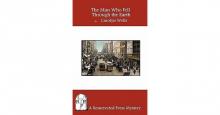 The Man Who Fell Through the Earth
The Man Who Fell Through the Earth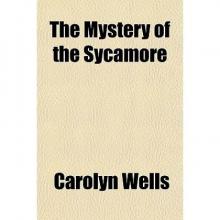 The Mystery of the Sycamore
The Mystery of the Sycamore The Mystery Girl
The Mystery Girl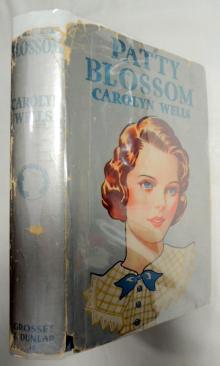 Patty Blossom
Patty Blossom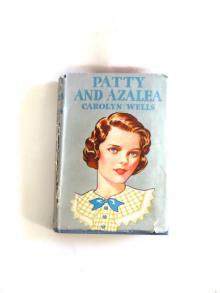 Patty and Azalea
Patty and Azalea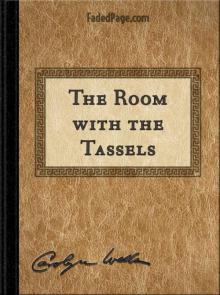 The Room with the Tassels
The Room with the Tassels The Vanishing of Betty Varian
The Vanishing of Betty Varian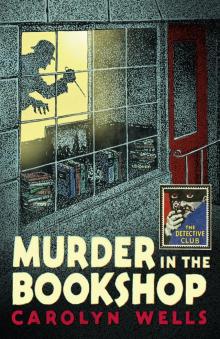 Murder in the Bookshop
Murder in the Bookshop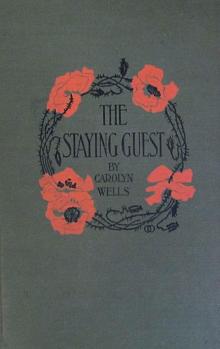 The Staying Guest
The Staying Guest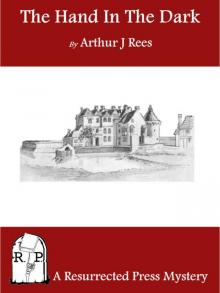 The Curved Blades
The Curved Blades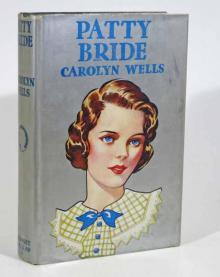 Patty—Bride
Patty—Bride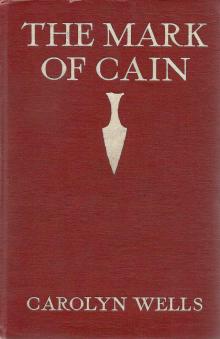 The Mark of Cain
The Mark of Cain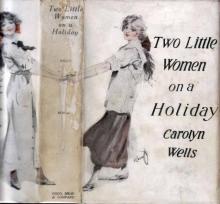 Two Little Women on a Holiday
Two Little Women on a Holiday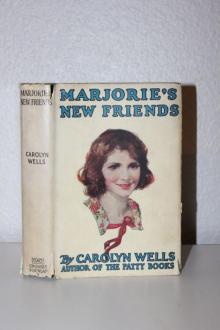 Marjorie's New Friend
Marjorie's New Friend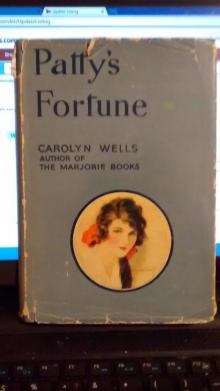 Patty's Fortune
Patty's Fortune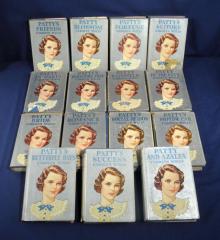 Patty's Social Season
Patty's Social Season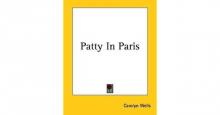 Patty in Paris
Patty in Paris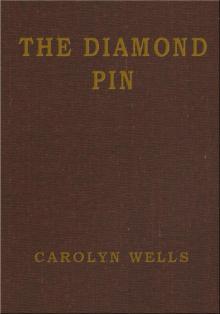 The Diamond Pin
The Diamond Pin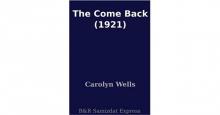 The Come Back
The Come Back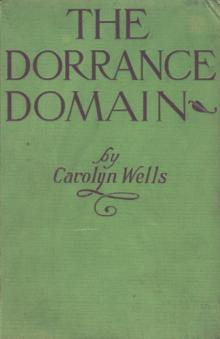 The Dorrance Domain
The Dorrance Domain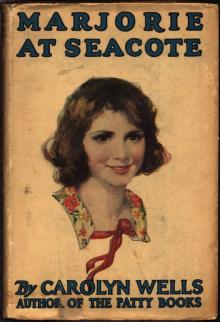 Marjorie at Seacote
Marjorie at Seacote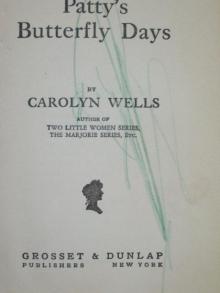 Patty's Butterfly Days
Patty's Butterfly Days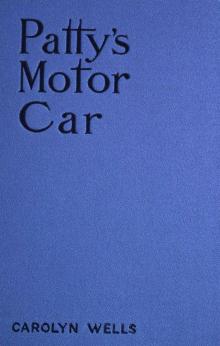 Patty's Motor Car
Patty's Motor Car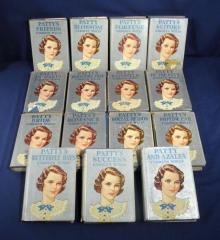 Patty's Success
Patty's Success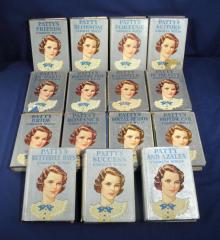 Patty's Suitors
Patty's Suitors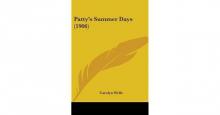 Patty's Summer Days
Patty's Summer Days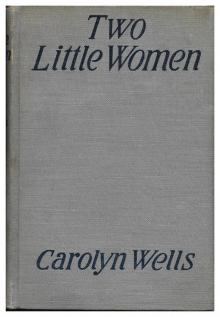 Two Little Women
Two Little Women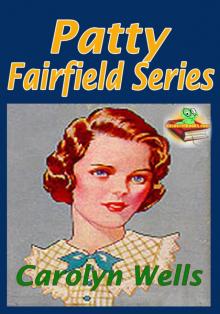 Patty Fairfield
Patty Fairfield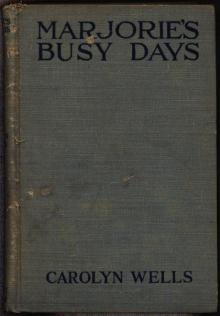 Marjorie's Busy Days
Marjorie's Busy Days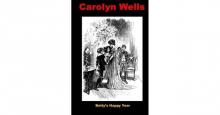 Betty's Happy Year
Betty's Happy Year In the Onyx Lobby
In the Onyx Lobby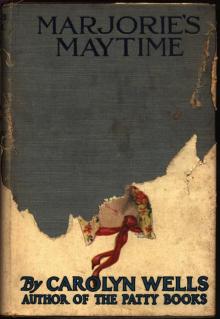 Marjorie's Maytime
Marjorie's Maytime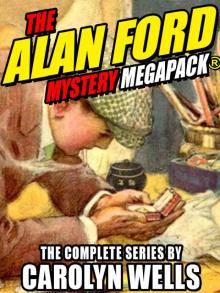 The Alan Ford Mystery MEGAPACK®
The Alan Ford Mystery MEGAPACK®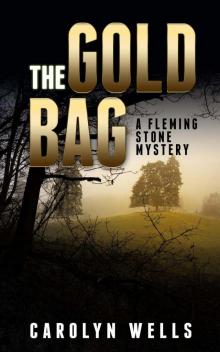 The Gold Bag
The Gold Bag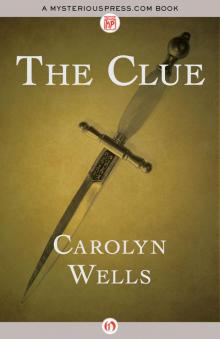 The Clue
The Clue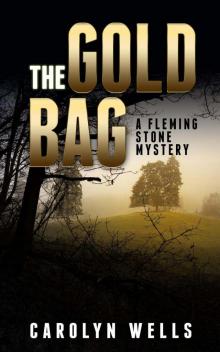 The Gold Bag : A Fleming Stone Mystery
The Gold Bag : A Fleming Stone Mystery